最新初中英语倒装句模拟试题
七年级英语倒装句运用练习题30题

七年级英语倒装句运用练习题30题1<背景文章>There was a great event at our school last week. In the schoolyard, here and there were colorful balloons. Not only were the students excited, but also the teachers. Under a big tree, there stood a stage. On the stage, many students were performing. Here came the dancers, dancing gracefully. There went the singers, singing beautifully.The audience was amazed by the wonderful performances. Suddenly, there rang a loud applause. Everyone was having a great time.1. Not only were the students excited, but also the teachers. This is an example of _______.A. normal sentenceB. interrogative sentenceC. inverted sentenceD. exclamatory sentence答案:C。
中文解析:这句话“Not only were the students excited, but also the teachers.”是一个倒装句的例子,所以选C。
2. There stood a stage. The underlined part is _______.A. a subjectB. a predicateC. an objectD. an adverbial答案:A。
中考英语倒装句特级综合练习题30题

中考英语倒装句特级综合练习题30题1.Never have I seen such a beautiful sunset.A.Seldom have IB.Hardly have IC.Rarely have ID.Never I have答案:前三个选项都正确,D 选项错误。
本题考查否定副词开头的倒装句。
以否定副词never、seldom、hardly、rarely 等开头的句子要用部分倒装,即把助动词、be 动词或情态动词提到主语前面。
D 选项没有进行倒装,所以错误。
2.Little did he know that his life would change forever.A.Seldom did heB.Hardly did heC.Few did heD.Little he did答案:前三个选项错误,D 选项错误。
以little 开头的句子要用部分倒装,A、B、C 选项虽然也是否定副词开头,但意思与little 不同,不能替换。
D 选项没有进行倒装,所以错误。
3.Nowhere can you find a more beautiful place.A.Seldom can youB.Hardly can youC.Rarely can youD.Nowhere you can答案:前三个选项错误,D 选项错误。
nowhere 开头要用部分倒装,D 选项没有倒装,所以错误。
前三个选项意思与nowhere 不同,不能替换。
4.Never before have I been so excited.A.Seldom have IB.Hardly have IC.Rarely have ID.Never before I have答案:前三个选项都正确,D 选项错误。
never before 开头要用部分倒装,D 选项没有倒装,所以错误。
前三个选项都是否定副词开头,与never before 意思相近,可以替换。
初三英语倒装句单选题20题(含答案)

初三英语倒装句单选题20题(含答案)1.Never in my life _____ such a beautiful place.A.have I seenB.I have seenC.did I seeD.I saw答案:A。
本题考查否定副词开头的部分倒装句。
never 表示否定,放在句首时句子要用部分倒装,即把助动词提到主语前面。
句子的时态是现在完成时,所以助动词用have。
B 选项是正常语序,错误。
C 选项时态不对。
D 选项也是正常语序且时态不对。
2.Hardly _____ when the rain started.A.had he arrivedB.he had arrivedC.did he arriveD.he arrived答案:A。
hardly 表示否定,位于句首句子要用部分倒装。
根据后面的when 引导的时间状语从句,主句要用过去完成时,所以是had he arrived。
B 选项正常语序错误。
C 选项时态不对。
D 选项正常语序且时态不对。
3.Seldom _____ to the movies.A.go IB.I goD.I do go答案:C。
seldom 表示否定,位于句首句子部分倒装,排除A、B 选项。
句子时态是一般现在时,所以助动词用do。
D 选项语序错误。
4.Little _____ about his own safety.A.does he careB.he caresC.cares heD.he does care答案:A。
little 表示否定,在句首句子部分倒装,排除B、D 选项。
一般现在时助动词用does。
C 选项语序错误。
5.Nowhere _____ find my keys.A.can IB.I canC.do I canD.I do can答案:A。
nowhere 表示否定,在句首句子部分倒装。
can 是情态动词,没有do can 的用法。
最新50套初中英语倒装句
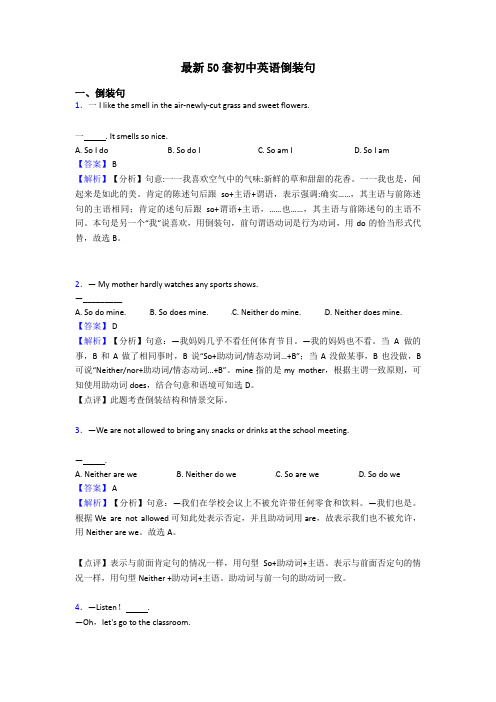
最新50套初中英语倒装句一、倒装句1.一 I like the smell in the air-newly-cut grass and sweet flowers.一 . It smells so nice.A. So I doB. So do IC. So am ID. So I am【答案】 B【解析】【分析】句意:一一我喜欢空气中的气味:新鲜的草和甜甜的花香。
一一我也是,闻起来是如此的美。
肯定的陈述句后跟so+主语+谓语,表示强调:确实……,其主语与前陈述句的主语相同;肯定的述句后跟so+谓语+主语,……也……,其主语与前陈述句的主语不同。
本句是另一个“我”说喜欢,用倒装句,前句谓语动词是行为动词,用do的恰当形式代替,故选B。
2.— My mother hardly watches any sports shows.—_________A. So do mine.B. So does mine.C. Neither do mine.D. Neither does mine.【答案】 D【解析】【分析】句意:—我妈妈几乎不看任何体育节目。
—我的妈妈也不看。
当A做的事,B和A做了相同事时,B说“So+助动词/情态动词…+B”;当A没做某事,B也没做,B 可说“Neither/nor+助动词/情态动词…+B”。
mine指的是my mother,根据主谓一致原则,可知使用助动词does,结合句意和语境可知选D。
【点评】此题考查倒装结构和情景交际。
3.—We are not allowed to bring any snacks or drinks at the school meeting.— .A. Neither are weB. Neither do weC. So are weD. So do we【答案】 A【解析】【分析】句意:—我们在学校会议上不被允许带任何零食和饮料。
—我们也是。
中考英语倒装句练习题(附答案)

典型例题: (1) Not until the early years of the 19th century___ what heat is. A. man did know B. man knew C. didn‘t man know D. did man know 答案为D. 否定词Not在句首,要求用部分倒装的句子结构。
注意:只有当Not only… but also连接两个分句时,才在第一个分句用倒装结构。如果置于句首的Not only… but also仅连接两个并列词语,不可用倒装结构。
01
Not only you but also I am fond of music.
01
so, neither, nor作部分倒装。
Not until the early years of the 19th century ___ what heat is.
答案D。看到Not until…的句型,我们知道为一倒装句,答案在C,D 中选一个。
A. man did know B. man know C. didn‘t man know D. did man know
01
Try hard as he will, he never seems able to do the work satisfactorily.
02
注意:
注意:
01
让步状语从句中,有though,although时,后面的主句不能有but,但是 though 和yet可连用。
02
其他部分倒装。
Not until I began to work ___ how much time I had wasted.
didn‘t I realize
初三英语倒装句分类练习题30题

初三英语倒装句分类练习题30题1.Near the house stands a tall tree.A.tall tree stands a houseB.a house stands a tall treeC.a tall tree a house standsD.stands a tall tree near the house答案:D。
完全倒装句结构是将谓语动词提到主语前面。
A 选项语序错误。
B 选项不是倒装句语序。
C 选项语序混乱。
D 选项正确地将谓语stands 提到了主语a tall tree 前面。
2.Under the table lies a cat.A.a cat lies under the tableB.under the table a cat liesC.lies a cat under the tableD.a cat under the table lies答案:C。
完全倒装句结构是将谓语动词提到主语前面,地点状语置于句末。
A 选项不是倒装句语序。
B 选项语序错误。
C 选项正确地将lies 提到了主语a cat 前面,under the table 置于句末。
D 选项语序混乱。
3.On the wall hangs a picture.A.a picture hangs on the wallB.on the wall a picture hangsC.hangs a picture on the wallD.a picture on the wall hangs答案:C。
完全倒装句结构是将谓语动词提到主语前面,地点状语置于句末。
A 选项不是倒装句语序。
B 选项语序错误。
C 选项正确地将hangs 提到了主语a picture 前面,on the wall 置于句末。
D 选项语序混乱。
4.In the garden are many flowers.A.many flowers are in the gardenB.in the garden many flowers areC.are many flowers in the gardenD.many flowers in the garden are答案:C。
倒装句(单选题 30题 含解析)初中英语专题练习 (1)

倒装句(单选题 30题含解析)初中英语专题练习一、单选题(共30题,总计0分)1.---Peter, I will visit our teacher this Sunday.\----_______. Let’s go together.A. Nor do IB. I will doC. So will ID. So can I2.A: I don't know how to use the software (软件).B: .A. So do IB. So am IC. Neither do ID. Neither am I 3.----Would you like to go to the amusement park?----If Jack does, __________.A. I go, tooB. so will IC. neither will ID. so do I4.—I'm not going swimming tomorrow afternoon.— . I have to clean up my bedroom.A. So am IB. Neither am IC. Neither I amD. So I am 5.--Li Ming didn't go to the old people's house yesterday.-- .A. So did IB. So I didC. Neither did ID. Neither I did 6.There ________some juice and some cakes on the table.A. isB. areC. amD. be 7.—Della likes dancing, but doesn't like swimming.—____________.A. So does MaryB. Neither does MaryC. So it is With MaryD. Nor does Mary 8.-I have never been to Hawaii. What about Mike? - .A. So has heB. So he doesC. Neither has heD. Neither he has 9.——Will your younger brother go for a picnic this Sunday?——If I don't go, ________ .A. so does heB. so will heC. neither does heD. Neither will he 10.— My mother hardly watches any sports shows.—______.A. So do IB. So does mineC. Neither do ID. Neither does mine11.— Jim went swimming with his parents yesterday afternoon.— _________.A. So Mary didB. So Mary doesC. So Mary wasD. So did Mary12.There ____an old clock, a computer and some books on the desk.A. haveB. areC. isD. has13.—Would your younger brother go for a picnic this Sunday?—If I don't go, _______.A. so does heB. so he willC. neither will heD. neither does he14.–My sister has never visited Eiffel Tower. How about you?– __________.A. So have IB. So did IC. Neither I haveD. Neither have I15.--David will never ____ though he fails again and again.--_______. So I believe both of you will succeed one day.A. give up, Neither will youB. give off, Neither you willC. take up, So will youD. take off, So you will16.—I've finished my homework, Tony.—_______.A. So have IB. So I haveC. So did ID. So I did 17.Here _____ the results _____ the students activity survey.A. is; withB. are; ofC. is; of18.-- I didn't go swimming yesterday afternoon.-- ______________. I had to clean up my bedroom.A. So did IB. Neither did IC. Neither I did.D. So I did19.----In recent years,more and more Americans like traveling during holidays.---_______.A.So do we Chinese B.So will we ChineseC.So we Chinese do D.So We Chinese will20.Only _________ save his life.A. can the doctorB. the doctor canC. will the doctorD. could the doctor21.— Peter, I will visit our teacher this Sunday.— _______. Let's go together.A. Nor do IB. I will doC. So will ID. So can I 22.—He has many books on science .—_____.A. So I haveB. So I doC. So do I23.-- He swam in the river this summer.-- ________A. So did he.B. So she did.C. So did she.24.-- Peter knows much French.-- ________.A. So do IB. So am IC. Neither do ID. Neither am I25.— I'm not allowed to go out on school nights.— ________..A. So am IB. Neither am IC. So I doD. Will be 26.—My brother and I will go to the library tomorrow.— . Shall we go together?A. So I doB. So do IC. So will ID. So I will27. In recent years more and more Indians like traveling in Asia during May Day. .A. So do we ChineseB. So we Chinese doC. Neither do we ChineseD. Neither we Chinese will28.—I like geography very much.— . It's my favorite subject in school.A. So am IB. So do IC. Neither do I29.–Jim likes listening to pop music.-- .A. So does Helen.B. Also is HelenC. Helen likes alsoD. So Helen does30.---I hear Huang Gang made an English speech at his graduation ceremony yesterday.--- ________, and ________.A. So he did, so did IB. So did he, so I didC. So he was, so was ID. So was he, so I was【参考答案及解析】1.C【解析】试题分析:“so+助动词(情态动词或连系动词)+另一主语”,此句型是主谓倒装结构,可以表示前面的情况也适用于后者,使用该句型需要注意以几个方面的问题: 1.该句型只能用于肯定句,不能用于否定句:如果前句是否定句,则要用“neither /nor +助动词+主语”。
(完整版)初中英语倒装句
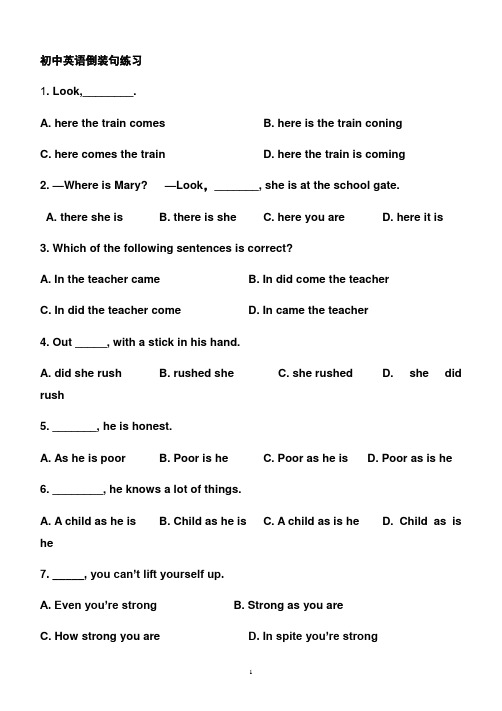
初中英语倒装句练习1. Look,________.A. here the train comesB. here is the train coningC. here comes the trainD. here the train is coming2. —Where is Mary? —Look,_______, she is at the school gate.A. there she isB. there is sheC. here you areD. here it is3. Which of the following sentences is correct?A. In the teacher cameB. In did come the teacherC. In did the teacher comeD. In came the teacher4. Out _____, with a stick in his hand.A. did she rushB. rushed sheC. she rushedD. she did rush5. _______, he is honest.A. As he is poorB. Poor is heC. Poor as he isD. Poor as is he6. ________, he knows a lot of things.A. A child as he isB. Child as he isC. A child as is heD. Child as is he7. _____, you can’t lift yourself up.A. Even you’re strongB. Strong as you areC. How strong you areD. In spite you’re strong8. So carelessly ________that he almost killed himself.A. he drivesB. he droveC. does he driveD. did he drive9. Early in the day ____the news _____the enemy were gone.A. come; thatB. came; thatC. comes; thatD. came; what10. Only when you realize the importance of foreign languages_____ them well.A. you can learnB. can you learnC. you learnedD. did you learn11. Only after liberation _____ to be treated as human beings.did they begin B. they had begun C. they did begin D. had they begun12. Not only ____ to stay at home, but he was also forbidden to see his friends.A. he was forcingB. he was forcedC. was he forcingD. was he forced13. Not until her father was out of prison____ to school.A. can John goB. John can goC. could John goD. John could go14. Never before _____ seen such a stupid man.A. am IB. was IC. have ID. shall I15. Rarely ____such a silly thing.A. have they heard ofB. they have heard ofC. am they heard ofD. had they heard of16. Little _____ about his own health though he was very ill.A. he caredB. did he careC. does he careD. he cares17. Only when _____ in the afternoon _____ able to leave.A. the match was over; they wereB. was the match over; were theyC. was the match over; they wereD. the match was over; were they18. Hardly ____ down ____ he stepped in.A. had I sat; thanB. I had sat; whenC. had I sat; thenD. had I sat; when19. No sooner _____asleep than she heard a knock at the door.A. she had fallenB. had she fallenC. she had fellD. had she fell20. She did not see Smith. ________.A. Neither did IB. Nor didn’t IC. Neither I didD. So didn’t I21. In front of the school ______.A. lay a peasant boyB. laid a peasant boyC. a peasant layD. did a peasant boy lie22. —You ought to have given them some advice. —_____, but who cared what I said ?A. So ought youB. So I oughtC. So did youD. So I did23. —It was warm yesterday. —_____.A. It was so.B. So was it.C. So it was.D. So it did24. No longer _____ to be monitor of the class.A. is he fitB. he is fitC. he fitD. fit be25. —I like football very much. —________.A. So do IB. So I doC. I do tooD. It is the same with me26. Only by practicing a few hours every day___ be able to master the language.A. you canB. can youC. you willD. will you27. Hardly _____ the bus stop ___ the bus arrived.A. we had got to; whenB. we had got to; thenC. had we got to; thanD. had we got to; when28. —Where is his brother? —There ______.A. he is comingB. he comesC. comes heD. doeshe come29. _____ earlier you would have met him.A. If you cameB. If you did comeC. Did you comeD. Had you come30. Not only ____ polluted but ____crowded.A. was the city; were the streetB. the city was; were the streetC. was the city; the streets wereD. the city was; the streets were31._______ and caught the mouse.A. Up the cat jumpedB. The cat up jumpedC. Up jumped the catD. Jumped up the cat32.______ and the lesson began.A. In came Mr BrownB. Mr Brown in cameC. In came heD. came in Mr Brown33. Over _______ , dead.A. rolling the goatB. rolled the goatC. did the goat rollD. the goat rolled34.—Where is his shirt? —_________.A. There is itB. There it isC. There isD. Here is it35. —Where is his father?—Oh, ________.A. here he comesB. he here comesC. here does he comeD. here comes he36. The door opened and there ________ .A. enters an old manB. entered an old manC. did an old man enterD. an old man entered37.1Zhou Ming likes reading English magazines.------.It is good for English learing.A.So do IB.So am IC.SoI doD.So I am38. Often _____ them not to smoke here.()A. we advisedB. advised weC. did we adviseD. had we advised39.________ playing soldiers.A. Inside the room were two boysB. Inside the room two boysC. Were two boys inside the roomD. Inside the room was two boys40. On the wall _______ two large portraits.A. are hangingB. hangedC. hangD. hangs41._______ who was wounded in the stomach.A. Among them were a soldierB. Among them was a soldierC. Among them a soldier wasD. Among they was a soldier42. Next door to ours ________ , who is no less than eighty.A. that lives an old manB. does an old man liveC. lives an old manD. where lives an old man43.She plays the piano very well, ______.A. so every one of us doesB. every one of us doesC. so does every one of usD. so do every one of us44.You say he works hard, ______, and _____.A. so he does; so you doB. so he does; so do youC. so does he; so do youD. so does he; so you do45. —I thought you women were present at the meeting.—__________.A. So we wereB. So we didC. So were weD. So did we46.I don’t think Jack will come today, _____.A. nor will MaryB. and Mary doesn’tC. Mary will eitherD. or Mary does47. She is fond of cooking, _____I .A. so amB. nor amC. neither doD. nor do48.Marx was born in Germany and German was his native language .A. So it was with AnglesB. So was it with AnglesC. So was AnglesD. So did Angles49.A fish needs water and without water it will die._______.A. So does a manB. So will a manC. So it is with a manD. So is it with a man50. So absorbed _______ the work that she often forgot to _____ her meals.A. had she been in; doB. she was in; makeC. was she in; takeD. she had been in ; have51.So loudly ______ that every one of the class could hear him.A. did he speakB. did he spokeC. spoke heD. he spoke52. __________ his appearance that no one could recognize him.A. Strange so wasB. So strange wasC. Was so strangeD. So was strange53.Not once ______ their plan.A. did they changeB. they changedC. changed theyD. they did change54. Never ______ such a wonderful place as Hangzhou.A. are seeingB. had I seenC. I have seenD. have I seen55.Seldom ______ TV during the day.A. they watchB. are they watchingC. have they watchedD. do they watch56.Nowhere ______ as in my garden.A. the flowers were so beautifulB. were the flowers so beautifulC. so beautiful were the flowersD. so beautiful the flowers were57. Hardly ________ his homework when he went out.A. finished heB. he had finishedC. did he finishD. had he finished58.Scarcely _____ finished their homework ______ I came into the classroom.A. had they; thanB. they had; whenC. had they; whenD. did they; when59. Not only _______ a promise, but also he kept it.A. has he madeB. does he makeC. he madeD. did he make60. Peter does not know many people here.------------------------------.A.I have not neitherB.I have not too.C.Me tooD.Me neither附选择题的答案;1-5 CADCC 6-10 BBDBB11-15 ADCCA 16-20 BDDBA21-25 ADCAB 26-30DDBDC31-35CABBA 36-40BABDA41-45BCCBA 46-50AAACC51-55ABADD 56-60 BDCDD。
初三英语倒装句单选题30题
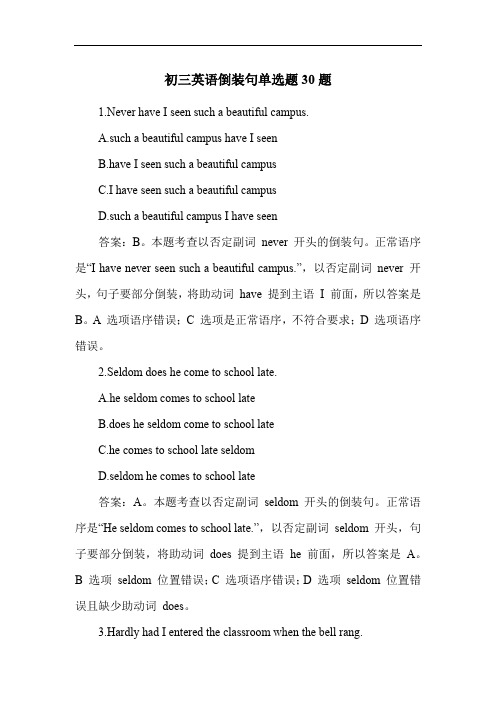
初三英语倒装句单选题30题1.Never have I seen such a beautiful campus.A.such a beautiful campus have I seenB.have I seen such a beautiful campusC.I have seen such a beautiful campusD.such a beautiful campus I have seen答案:B。
本题考查以否定副词never 开头的倒装句。
正常语序是“I have never seen such a beautiful campus.”,以否定副词never 开头,句子要部分倒装,将助动词have 提到主语I 前面,所以答案是B。
A 选项语序错误;C 选项是正常语序,不符合要求;D 选项语序错误。
2.Seldom does he come to school late.A.he seldom comes to school lateB.does he seldom come to school lateC.he comes to school late seldomD.seldom he comes to school late答案:A。
本题考查以否定副词seldom 开头的倒装句。
正常语序是“He seldom comes to school late.”,以否定副词seldom 开头,句子要部分倒装,将助动词does 提到主语he 前面,所以答案是A。
B 选项seldom 位置错误;C 选项语序错误;D 选项seldom 位置错误且缺少助动词does。
3.Hardly had I entered the classroom when the bell rang.A.I had hardly entered the classroom when the bell rangB.had I hardly entered the classroom when the bell rangC.I hardly had entered the classroom when the bell rangD.hardly I had entered the classroom when the bell rang答案:A。
初三英语倒装句单选题50题
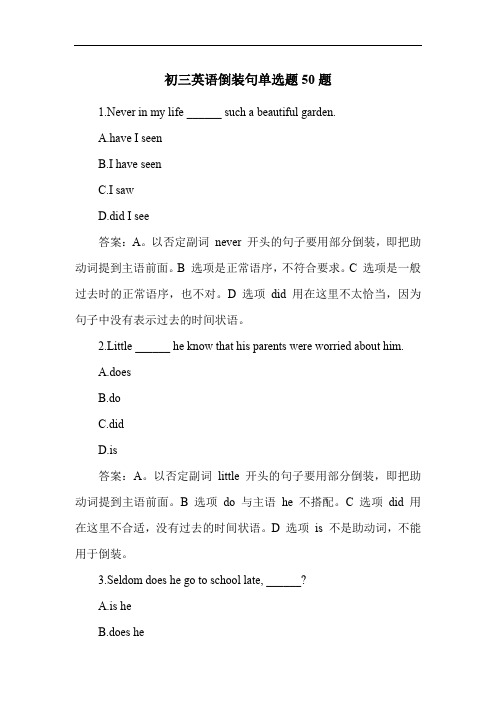
初三英语倒装句单选题50题1.Never in my life ______ such a beautiful garden.A.have I seenB.I have seenC.I sawD.did I see答案:A。
以否定副词never 开头的句子要用部分倒装,即把助动词提到主语前面。
B 选项是正常语序,不符合要求。
C 选项是一般过去时的正常语序,也不对。
D 选项did 用在这里不太恰当,因为句子中没有表示过去的时间状语。
2.Little ______ he know that his parents were worried about him.A.doesB.doC.didD.is答案:A。
以否定副词little 开头的句子要用部分倒装,即把助动词提到主语前面。
B 选项do 与主语he 不搭配。
C 选项did 用在这里不合适,没有过去的时间状语。
D 选项is 不是助动词,不能用于倒装。
3.Seldom does he go to school late, ______?A.is heB.does heC.doesn't heD.isn't he答案:B。
seldom 开头的句子是部分倒装,前面用肯定形式,后面反问用肯定形式does he。
A 选项is he 不对,因为前面是实义动词go。
C 选项doesn't he 是错误的反问形式。
D 选项isn't he 也不对。
4.Hardly had he entered the classroom ______ the bell rang.A.whenB.thanC.thatD.as答案:A。
hardly...when...是固定搭配,表示“一……就……”,hardly 开头的句子要用部分倒装。
B 选项than 用在这里不合适。
C 选项that 不是正确的搭配。
D 选项as 也不对。
5.Never before ______ so many people been interested in sports.A.haveB.hasC.hadD.is答案:A。
初中英语倒装句专项训练20题

初中英语倒装句专项训练20题1. Here comes the bus. (这是一个完全倒装句,正常语序是The bus comes here. )2. Out rushed the children. (正常语序是The children rushed out. )3. Away flew the bird. (正常语序是The bird flew away. )4. Down came the rain. (正常语序是The rain came down. )5. There stands a tall tree. (正常语序是A tall tree stands there. )6. Never have I seen such a beautiful place. (解析:否定词never 前置,句子使用部分倒装,将助动词have 提到主语I 之前。
)7. Not only does he like music, but also he plays the piano well. (解析:Not only 位于句首,句子使用部分倒装,将助动词does 提到主语he 之前。
)8. Seldom does she go to the cinema. (解析:否定词seldom 前置,句子使用部分倒装,将助动词does 提到主语she 之前。
)9. Hardly had I reached the station when the train left. (解析:Hardly 位于句首,句子使用部分倒装,将助动词had 提到主语I 之前。
)10. Little did he know about the news. (解析:否定词Little 前置,句子使用部分倒装,将助动词did 提到主语he 之前。
)11. She likes swimming, so do I. (解析:前句表示“她喜欢游泳”,后句用“so + 助动词+ 主语”表示“我也喜欢”)。
初三英语倒装句单选题20题答案解析版
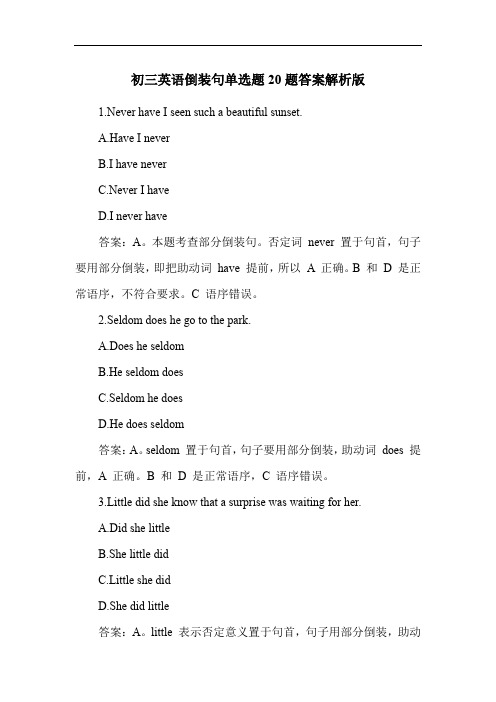
初三英语倒装句单选题20题答案解析版1.Never have I seen such a beautiful sunset.A.Have I neverB.I have neverC.Never I haveD.I never have答案:A。
本题考查部分倒装句。
否定词never 置于句首,句子要用部分倒装,即把助动词have 提前,所以 A 正确。
B 和D 是正常语序,不符合要求。
C 语序错误。
2.Seldom does he go to the park.A.Does he seldomB.He seldom doesC.Seldom he doesD.He does seldom答案:A。
seldom 置于句首,句子要用部分倒装,助动词does 提前,A 正确。
B 和D 是正常语序,C 语序错误。
3.Little did she know that a surprise was waiting for her.A.Did she littleB.She little didC.Little she didD.She did little答案:A。
little 表示否定意义置于句首,句子用部分倒装,助动词did 提前,A 正确。
B、C、D 语序错误。
4.Not only does he play basketball well, but also he is good at football.A.Does he not onlyB.He not only doesC.Not only he doesD.He does not only答案:A。
not only 置于句首,句子用部分倒装,助动词does 提前,A 正确。
B、C、D 语序错误。
5.Hardly had he arrived when the meeting started.A.Had he hardlyB.He hardly hadC.Hardly he hadD.He had hardly答案:A。
(完整版)初中英语倒装句练习题(2)
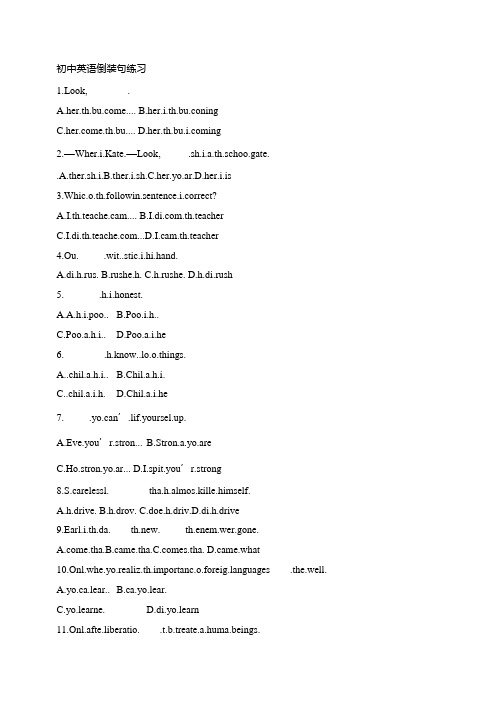
初中英语倒装句练习1.Look,________.e....B.her.i.th.bu.coninge.th.bu....ing2.—Wher.i.Kate.—Look, _____.sh.i.a.th.schoo.gate..A.ther.sh.i.B.ther.i.sh.C.her.yo.ar.D.her.i.is3.Whic.o.th.followin.sentence.i.correct?A.I.th.teache.cam.....th.teacher...D.I.cam.th.teacher4.Ou._____.wit..stic.i.hi.hand.A.di.h.rus.B.rushe.h.C.h.rushe.D.h.di.rush5._______.h.i.honest.A.A.h.i.poo..B.Poo.i.h..C.Poo.a.h.i..D.Poo.a.i.he6.________.h.know..lo.o.things.A..chil.a.h.i..B.Chil.a.h.i.C..chil.a.i.h.D.Chil.a.i.he7._____.yo.can’.lif.yoursel.up.A.Eve.you’r.stron...B.Stron.a.yo.areC.Ho.stron.yo.ar...D.I.spit.you’r.strong8.S.carelessl.________tha.h.almos.kille.himself.A.h.drive.B.h.drov.C.doe.h.driv.D.di.h.drive9.Earl.i.th.da.____th.new._____th.enem.wer.gone.e.tha.B.came.tha.es.tha.D.came.whatnguages____.the.well.A.yo.ca.lear..B.ca.yo.lear.C.yo.learne.D.di.yo.learn11.Onl.afte.liberatio.____.t.b.treate.a.huma.beings.A.di.the.begi.B.the.ha.begu.C.the.di.begi.D.ha.the.begun12.No.onl.___.t.sta.a.home.bu.h.wa.als.forbidde.t.se.hi.friends.A.h.wa.forcin..B.h.wa.force..C.wa.h.forcin.D.wa.h.forced13.No.unti.hi.fathe.wa.ou.o.prison___.t.school.A.ca.Joh.g.B.Joh.ca.g.C.coul.Joh.g.D.Joh.coul.go14.Neve.befor.____.see.suc..stupi.man.A.a.....B.wa....C.hav..D.shal.I15.Rarel.____suc..sill.thing.A.hav..hear.o..B..hav.hear.ofC.a..hear.o.D.ha..hear.of16.Littl.____.abou.hi.ow.healt.thoug.h.wa.ver.ill.A.h.care.B.di.h.car.C.doe.h.careD.h.cares17.Onl.whe.____.i.th.afternoo. ____.abl.t.leave.A.th.matc.wa.over.the.wer.B.wa.th.matc.over.wer.theyC.wa.th.matc.over.the.wereD.th.matc.wa.over.wer.they18.Hardl.___.dow.___.h.steppe.in.A.ha..sat.tha..B..ha.sat.whe.C.ha..sat.the..D.ha..sat.when19.N.soone._____aslee.tha.sh.hear..knoc.a.th.door.A.sh.ha.falle..B.ha.sh.falle.C.sh.ha.fel.D.ha.sh.fell20.Sh.di.no.se.Smith.________.A.Neithe.di...B.No.didn’...C.Neithe..di..D.S.didn’.I21.I.fron.o.th.farmhous.______...peasan.boyi..peasan.boyyD.di..peasan.bo.lie22.—Yo.ough.t.hav.give.the.som.advice..—_____, but who cared what I said ?A.S.ough.yo.B.S..ough.C.S.di.yo.D.S..did23.—I.wa.ho.yesterday. —_____.A.I.wa.so.B.S.wa.it.C.S.i.was.D.S.i.did24.N.longe.____.t.b.monito.o.th.class.A.i.h.fi.B.h.i.fit.C.h.fitD.fi.be25.—Yo.lik.footbal.ver.much..—________.A.S.d..B.S..d.C..d.to.D.I.i.th.sam.wit.me26.Onl.b.practicin..fe.hour.ever.day__nguage.A.yo.ca..B.ca.yo.C.yo.wil..D.wil.you27.Hardl.____.th.bu.sto.__.th.bu.arrived.A.w.ha.go.to.whe...B.w.ha.go.to.thenC.ha.w.go.to.tha....D.ha.w.go.to.when28.—Wher.i.you.brother..—Ther.______.in..e..e.h..e29.____.earlie.yo.woul.hav.me.him.A.I.yo.cam.....e30.No.onl.___.pollute.bu.____crowded.A.wa.th.city.wer.th.stree.B.th.cit.was.wer.th.streetC.was the city; the streets wereD.the city was; the streets were31.Sh.i..teache.an.work.a.th.college._______.A.S.i.L.Min....B.S.doe.L.Min.C.S.i.i.wit.L.Min.D.S.i.i.wit.L.Ming32.No.__.Tom’.tur.t.recit.th.text.A.ther.i.B.i.goin..es34.______.readin.an.speakin.Englis.ever.day.h.woul.spea.i.wel.enoug.now.A.Ha.h.practiced..B.Di.h.practiceC.Shoul.h.practic.D.Wer.h.t.practice35.Nearb.____.i.whic.the.ha.spen.thei.summe.vacation.A.wa.tw.houses..B.tw.house.wereC.wer.tw.housesD.ar.tw.houses36.No.onl..write.bu.als._____.here.A.a.acto.wa.wantedB.wa.a.acto.wantedC.a.acto.wer.wantedD.wer.a.acto.wanted37.S.tire.___.afte..whol.day’.heav.wor.tha..___.stan.o.m.feet.A.wa.I.coul.hardl..B.wa..felt.coul.hardlyC.wa.I.couldn’.hardl...D..was.hardl.couldn’t39.Afte.tha.w.neve.sa.he.again.no._______.fro.her.A.di.w.hea....B.w.heardC.ha.w.hear....D.w.hav.hear......40.No.unti..bega.t.wor.____.ho.muc.tim..ha.wasted.A.didn’..realiz. ..B.di..realizeC..didn’.realiz...D..realiz....43.No.unti.al.th.fis.die.i.th.rive.____.ho.seriou.th.pollutio.was.A.di.th.villager.realiz...B.th.villager.realizedC.th.villager.di.realize..D.didn’.th.villager.realiz....44.Littl.____.abou.hi.ow.safety.thoug.h.wa.i.grea.dange.himself.A.doe.h.car.. ..B.di.h.careC.h.care.....D.h.care......45.—Davi.ha.mad.grea.progres.recently..—_______, and _______.A.S.h.has.s.yo.hav...B.S.h.has.s.hav.youC.S.ha.he.s.hav... .D.S.ha.he.s.yo.hav...46.—I.wa.careles.o.yo.t.hav.lef.you.clothe.outsid.al.night.—My God! ______.A.S.di..B.S..di.C.S.wer.yo.D.S.di.yo.47.No..singl.son._______.a.yesterday’.party.A.sh.san.B.san.sh.C.di.sh.sin..D.sh.di.sin..48.____.th.peopl.hav.becom.master.o.thei.ow.countr.tha.scienc.ca.reall.serv.th.people.A.Onl.the. ..B.I.i.onl.the.C.Onl.whenD.I.i.onl.when49.No.onl.______.difficul.t.understand.bu.i.wa.to.long.A.i.wa.B.i.mad..C.di.i.mak.D.wa.it50.Onl.whe.th.rai.stoppe.____.again.A.th.matc.starte...B.doe.th.matc.startC.di.th.matc.star...D.th.matc.ha.started51._____.ha..finishe.m.translatio.whe.th.clas.wa.over.A.Neve..B.N.soone..C.Hardl..D.How52.I.______.an.th.lesso.began.A.h.cam..B.cam.h.e.e.he53.O.th.wal._____rg.pictures.A.hang.B.han.C.hange.D.ar.hanging54.Suc._____.th.result.o.th.experiments.A.i.B.wa.C.ar.D.a.b.55.—The.hav.don..goo.job. —________.A.S.the.hav.don..B.S.the.hav.C.S.hav.the.D.S.i.it56._____t.t.retur.home.A.N.soone.i.gre.dar.tha.B.Hardl.di.i.gro.dar.whe.C.I.wa.no.unti.dar.tha.D.I.wa.unti.dar.tha.57._____.Mothe.wil.wai.fo.hi.t.hav.dinne.together.t.i.h...t.t...t.h.is58. _____ hot is the sun that we cannot go out at present.A.VeryB.TooC.SoD.Such1.在以here、there、 now 、 then 、 up、down 、 in 、out 、off、away等表示运动方向的副词或地点状语置于句首以示强调, 句子要全部倒装。
初三英语倒装句完形填空题70题
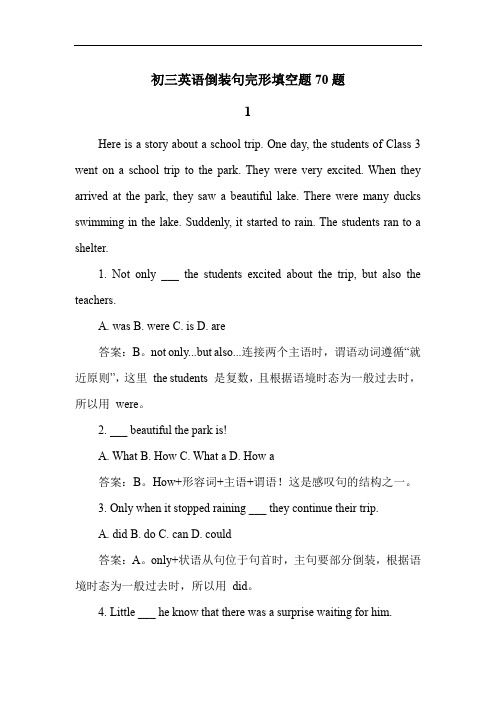
初三英语倒装句完形填空题70题1Here is a story about a school trip. One day, the students of Class 3 went on a school trip to the park. They were very excited. When they arrived at the park, they saw a beautiful lake. There were many ducks swimming in the lake. Suddenly, it started to rain. The students ran to a shelter.1. Not only ___ the students excited about the trip, but also the teachers.A. wasB. wereC. isD. are答案:B。
not only...but also...连接两个主语时,谓语动词遵循“就近原则”,这里the students 是复数,且根据语境时态为一般过去时,所以用were。
2. ___ beautiful the park is!A. WhatB. HowC. What aD. How a答案:B。
How+形容词+主语+谓语!这是感叹句的结构之一。
3. Only when it stopped raining ___ they continue their trip.A. didB. doC. canD. could答案:A。
only+状语从句位于句首时,主句要部分倒装,根据语境时态为一般过去时,所以用did。
4. Little ___ he know that there was a surprise waiting for him.A. didB. doC. doesD. has答案:A。
初二英语倒装句填空练习题40题
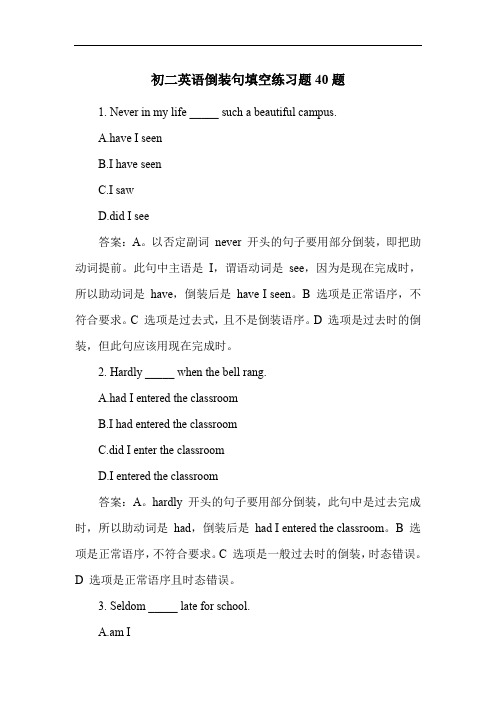
初二英语倒装句填空练习题40题1. Never in my life _____ such a beautiful campus.A.have I seenB.I have seenC.I sawD.did I see答案:A。
以否定副词never 开头的句子要用部分倒装,即把助动词提前。
此句中主语是I,谓语动词是see,因为是现在完成时,所以助动词是have,倒装后是have I seen。
B 选项是正常语序,不符合要求。
C 选项是过去式,且不是倒装语序。
D 选项是过去时的倒装,但此句应该用现在完成时。
2. Hardly _____ when the bell rang.A.had I entered the classroomB.I had entered the classroomC.did I enter the classroomD.I entered the classroom答案:A。
hardly 开头的句子要用部分倒装,此句中是过去完成时,所以助动词是had,倒装后是had I entered the classroom。
B 选项是正常语序,不符合要求。
C 选项是一般过去时的倒装,时态错误。
D 选项是正常语序且时态错误。
3. Seldom _____ late for school.A.am IB.I amC.was ID.I was答案:A。
seldom 开头的句子要用部分倒装,此句是一般现在时,主语是I,所以be 动词是am,倒装后是am I。
B 选项是正常语序,不符合要求。
C 和D 选项时态错误。
4. Never before _____ so many students interested in English.A.have beenB.areC.wereD.had been答案:A。
never before 开头的句子要用部分倒装,此句是现在完成时,主语是so many students,所以be 动词是have been,倒装后是have been。
初三英语倒装句特殊情况单选题40题
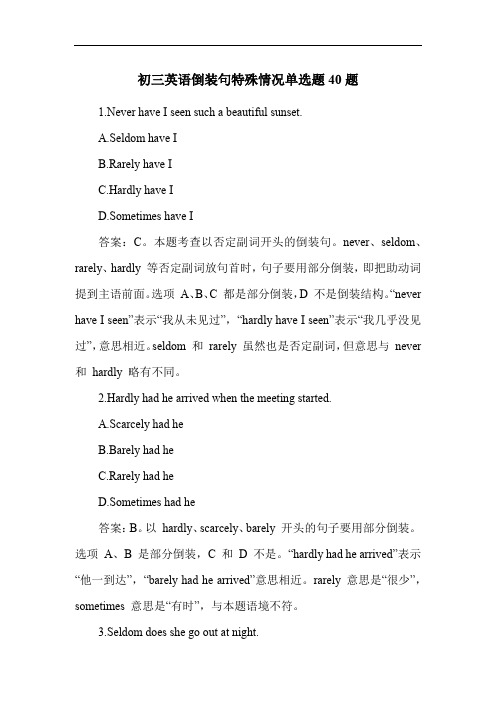
初三英语倒装句特殊情况单选题40题1.Never have I seen such a beautiful sunset.A.Seldom have IB.Rarely have IC.Hardly have ID.Sometimes have I答案:C。
本题考查以否定副词开头的倒装句。
never、seldom、rarely、hardly 等否定副词放句首时,句子要用部分倒装,即把助动词提到主语前面。
选项A、B、C 都是部分倒装,D 不是倒装结构。
“never have I seen”表示“我从未见过”,“hardly have I seen”表示“我几乎没见过”,意思相近。
seldom 和rarely 虽然也是否定副词,但意思与never 和hardly 略有不同。
2.Hardly had he arrived when the meeting started.A.Scarcely had heB.Barely had heC.Rarely had heD.Sometimes had he答案:B。
以hardly、scarcely、barely 开头的句子要用部分倒装。
选项A、B 是部分倒装,C 和D 不是。
“hardly had he arrived”表示“他一到达”,“barely had he arrived”意思相近。
rarely 意思是“很少”,sometimes 意思是“有时”,与本题语境不符。
3.Seldom does she go out at night.A.Rarely does sheB.Often does sheC.Always does sheD.Never does she答案:A。
seldom 和rarely 都是否定副词,放句首时要用部分倒装。
选项A 是部分倒装,B、C 是肯定副词,放句首不用倒装,D 虽然是否定副词,但与seldom 意思不完全一样。
4.Never before have I tasted such delicious food.A.Seldom have IB.Rarely have IC.Hardly ever have ID.Sometimes have I答案:C。
初中英语倒装句单选题40题

初中英语倒装句单选题40题1. Here ______ the bus.A. comesB. comeC. comingD. to come答案:A。
本题考查完全倒装句,Here 位于句首,句子要完全倒装,主语是the bus ,是单数,所以谓语动词用comes 。
B 选项come 用于主语是复数的情况;C 选项coming 不能单独作谓语;D 选项to come 是动词不定式,不能作谓语。
2. Out rushed the children.A. Out rushedB. Out rushC. Out rushesD. Out rushing答案:A。
这是一个完全倒装句,Out 位于句首,句子完全倒装,主语是the children ,rushed 是过去式,与主语的复数形式搭配。
B 选项rush 是一般现在时,时态不对;C 选项rushes 是第三人称单数形式,主语不是单数;D 选项rushing 不能作谓语。
3. There goes the bell.A. There goesB. There goC. There goingD. There to go答案:A。
Here/There 位于句首,句子完全倒装,主语是the bell ,是单数,所以谓语动词用goes 。
B 选项go 用于主语是复数的情况;C 选项going 不能单独作谓语;D 选项to go 是动词不定式,不能作谓语。
4. Away flew the bird.A. Away flewB. Away flyC. Away fliesD. Away flying答案:A。
Away 位于句首,句子完全倒装,主语是the bird ,是单数,所以谓语动词用flew 。
B 选项fly 用于主语是复数的情况;C 选项flies 是第三人称单数形式,主语不是单数;D 选项flying 不能作谓语。
5. Down came the rain.A. Down cameB. Down comeC. Down comesD. Down coming答案:A。
初三英语倒装句单选题30题
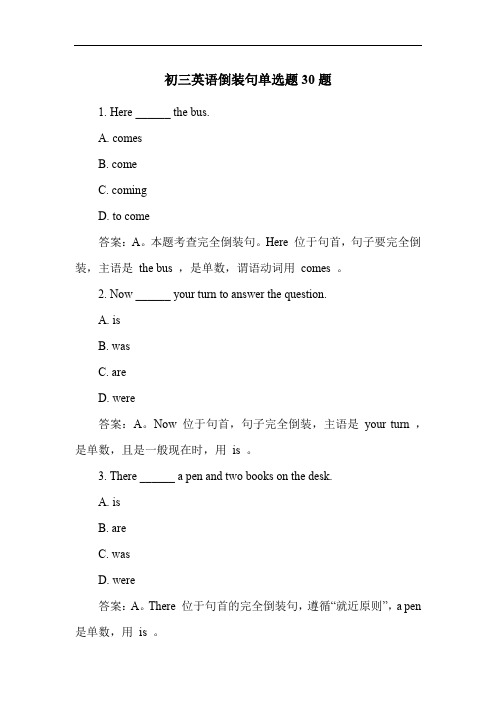
初三英语倒装句单选题30题1. Here ______ the bus.A. comesB. comeC. comingD. to come答案:A。
本题考查完全倒装句。
Here 位于句首,句子要完全倒装,主语是the bus ,是单数,谓语动词用comes 。
2. Now ______ your turn to answer the question.A. isB. wasC. areD. were答案:A。
Now 位于句首,句子完全倒装,主语是your turn ,是单数,且是一般现在时,用is 。
3. There ______ a pen and two books on the desk.A. isB. areC. wasD. were答案:A。
There 位于句首的完全倒装句,遵循“就近原则”,a pen 是单数,用is 。
4. In front of the house ______ a big tree.A. standB. standsC. standingD. to stand答案:B。
In front of the house 位于句首,句子完全倒装,主语是a big tree ,是单数,用stands 。
5. Away ______ when they saw the police.A. ran the thiefB. the thief ranC. did the thief runD. the thief did run答案:A。
Away 位于句首,句子完全倒装,ran 是谓语动词,the thief 是主语。
6. Never in my life ______ such a beautiful place.A. have I seenB. I have seenC. did I seeD. I saw答案:A。
本题考查部分倒装。
never 位于句首,句子要部分倒装,将助动词have 提到主语I 前面,所以排除B、D 选项。
初中英语倒装句模拟试题含解析
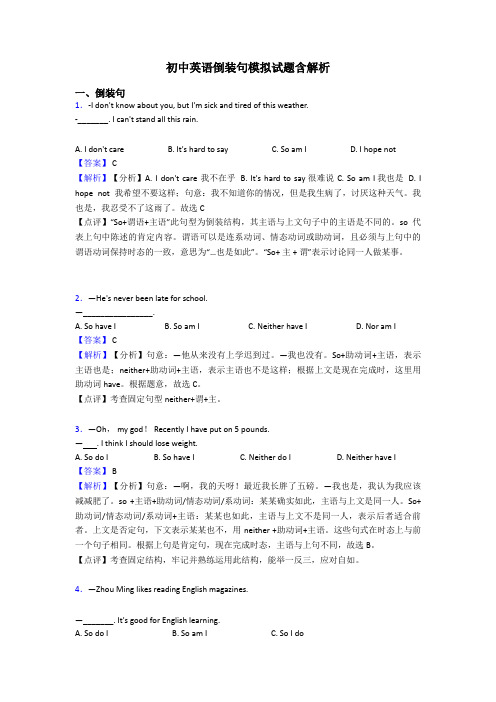
初中英语倒装句模拟试题含解析一、倒装句1.-I don't know about you, but I'm sick and tired of this weather.-_______. I can't stand all this rain.A. I don't careB. It's hard to sayC. So am ID. I hope not【答案】 C【解析】【分析】A. I don't care 我不在乎 B. It's hard to say很难说C. So am I 我也是 D. I hope not我希望不要这样;句意:我不知道你的情况,但是我生病了,讨厌这种天气。
我也是,我忍受不了这雨了。
故选C【点评】“So+谓语+主语”此句型为倒装结构,其主语与上文句子中的主语是不同的。
so代表上句中陈述的肯定内容。
谓语可以是连系动词、情态动词或助动词,且必须与上句中的谓语动词保持时态的一致,意思为“…也是如此”。
“So+ 主 + 谓”表示讨论同一人做某事。
2.—He's never been late for school.—________________.A. So have IB. So am IC. Neither have ID. Nor am I【答案】 C【解析】【分析】句意:—他从来没有上学迟到过。
—我也没有。
So+助动词+主语,表示主语也是;neither+助动词+主语,表示主语也不是这样;根据上文是现在完成时,这里用助动词have。
根据题意,故选C。
【点评】考查固定句型neither+谓+主。
3.—Oh, my god! Recently I have put on 5 pounds.— . I think I should lose weight.A. So do IB. So have IC. Neither do ID. Neither have I【答案】 B【解析】【分析】句意:—啊,我的天呀!最近我长胖了五磅。
最新初中英语倒装句专项训练100(附答案)
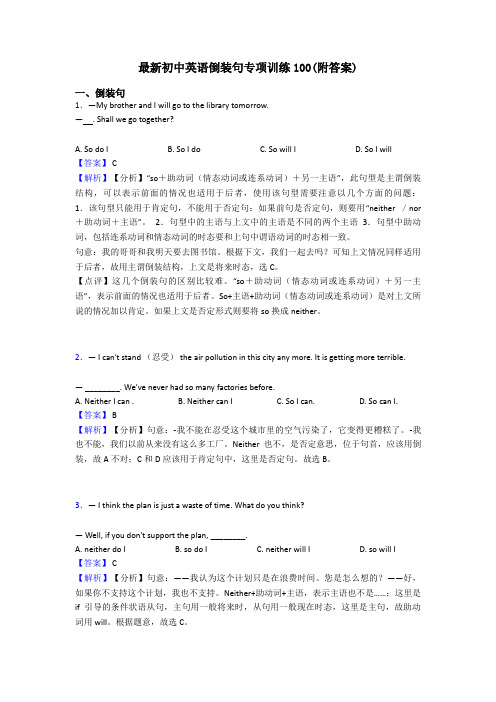
最新初中英语倒装句专项训练100(附答案)一、倒装句1.—My brother and I will go to the library tomorrow.— . Shall we go together?A. So do IB. So I doC. So will ID. So I will【答案】 C【解析】【分析】“so+助动词(情态动词或连系动词)+另一主语”,此句型是主谓倒装结构,可以表示前面的情况也适用于后者,使用该句型需要注意以几个方面的问题:1.该句型只能用于肯定句,不能用于否定句:如果前句是否定句,则要用“neither /nor +助动词+主语”。
2.句型中的主语与上文中的主语是不同的两个主语3.句型中助动词,包括连系动词和情态动词的时态要和上句中谓语动词的时态相一致。
句意:我的哥哥和我明天要去图书馆。
根据下文,我们一起去吗?可知上文情况同样适用于后者,故用主谓倒装结构,上文是将来时态,选C。
【点评】这几个倒装句的区别比较难。
“so+助动词(情态动词或连系动词)+另一主语”,表示前面的情况也适用于后者。
So+主语+助动词(情态动词或连系动词)是对上文所说的情况加以肯定。
如果上文是否定形式则要将so换成neither。
2.— I can't stand (忍受) the air pollution in this city any more. It is getting more terrible.— ________. We've never had so many factories before.A. Neither I can .B. Neither can IC. So I can.D. So can I.【答案】 B【解析】【分析】句意:-我不能在忍受这个城市里的空气污染了,它变得更糟糕了。
-我也不能,我们以前从来没有这么多工厂。
Neither也不,是否定意思,位于句首,应该用倒装,故A不对;C和D应该用于肯定句中,这里是否定句。
- 1、下载文档前请自行甄别文档内容的完整性,平台不提供额外的编辑、内容补充、找答案等附加服务。
- 2、"仅部分预览"的文档,不可在线预览部分如存在完整性等问题,可反馈申请退款(可完整预览的文档不适用该条件!)。
- 3、如文档侵犯您的权益,请联系客服反馈,我们会尽快为您处理(人工客服工作时间:9:00-18:30)。
最新初中英语倒装句模拟试题一、倒装句1.-I don't know about you, but I'm sick and tired of this weather.-_______. I can't stand all this rain.A. I don't careB. It's hard to sayC. So am ID. I hope not【答案】 C【解析】【分析】A. I don't care 我不在乎 B. It's hard to say很难说C. So am I 我也是 D. I hope not我希望不要这样;句意:我不知道你的情况,但是我生病了,讨厌这种天气。
我也是,我忍受不了这雨了。
故选C【点评】“So+谓语+主语”此句型为倒装结构,其主语与上文句子中的主语是不同的。
so代表上句中陈述的肯定内容。
谓语可以是连系动词、情态动词或助动词,且必须与上句中的谓语动词保持时态的一致,意思为“…也是如此”。
“So+ 主 + 谓”表示讨论同一人做某事。
2.If you go to his party tomorrow,A. won't, neither do IB. don't, neither will IC. don't, neither do ID. /, so do I 【答案】 B【解析】【分析】句意:如果你明天不参加他的聚会,我也不去。
分析:考查if引导的条件状语从句,通过时间状语tomorrow体现时间将来时,因此从句用一般现在时,主语是第二人称用do; 我也不去,为主句,同时前句为否定形式,因此用neither.故选 B【点评】考查if条件状语从句应使用主将从现。
3.— My mother hardly watches any sports shows.—_________A. So do mine.B. So does mine.C. Neither do mine.D. Neither does mine.【答案】 D【解析】【分析】句意:—我妈妈几乎不看任何体育节目。
—我的妈妈也不看。
当A做的事,B和A做了相同事时,B说“So+助动词/情态动词…+B”;当A没做某事,B也没做,B 可说“Neither/nor+助动词/情态动词…+B”。
mine指的是my mother,根据主谓一致原则,可知使用助动词does,结合句意和语境可知选D。
【点评】此题考查倒装结构和情景交际。
4.—I didn't go to Tom's birthday party yesterday. What about you?—________, because I was preparing for the exam all the time.A. Neither was IB. Neither am IC. Neither did ID. Neither do I【答案】 C【解析】【分析】句意:昨天我没有去汤姆的生日宴会,你呢?——我也没去,因为我一直准备考试。
根据倒装句neither助动词-主语,表示主语也没去做上面的那件事情,根据题意可知是用一般过去时故助动词用did。
故选C。
【点评】考查特殊句式,本题涉及倒装句neither助动词-主语。
5.—I didn't go to the cinema yesterday. What about you?—____________, because I was preparing for the project all the time.A. Nor do IB. Neither did IC. Neither am ID. Nor was I【答案】 B【解析】【分析】句意:—我昨天没有去电影院,你的?—我也没去,因为我一直在准备这个项目。
根据句意及题干分析此题是过去也没去,所以选B。
6.—Listen! .—Oh,let's go to the classroom.A. There goes the bellB. There's the bellC. There the bell goesD. The bell goes there 【答案】 A【解析】【分析】句意:---听,铃响了。
---哦,咱们去教室吧。
There goes the bell是倒装句,相当于“The bell is ringing。
”故答案为A。
【点评】考查倒装句。
7.—My brother got up very early last Sunday.—________.A. So I didB. So I wasC. So did I【答案】 C【解析】【分析】句意:——上星期天我哥哥起得很早。
——我也是。
so+谓语+主语,……也是,so+主语+谓语,的确是,此处表示某人也是,因此用so did I,故选C。
【点评】考查固定搭配,注意so+谓语+主语的用法。
8.My sister went to the cinema, and _________________.A. so did IB. so have IC. neither did ID. neither have I【答案】 A【解析】【分析】句意:我姐姐去看电影了,我也是。
went是一般过去时,助动词是did,故排除B和D选项,省略句,so+助动词+主语,用于肯定句,……也是,neither+助动词+主语,用于否定句,……也是,根据My sister went to the cinema,可知是肯定句,故选A。
【点评】考查省略句,注意so+助动词+主语的用法。
9.—Jane can speak Chinese well now.—___and ___.A. So she can, so you canB. So she is, so are youC. So she can, so can you【答案】 C【解析】【分析】句意:——简现在能把汉语说得很好。
——确实如此,而且你也说得好。
考查so引导的强调句及倒装句的用法。
A.(她)的确如此,(你)的确如此。
B. (她)的确如此,你也是。
C. (她)的确如此,你也能。
“so+主语+系动词/助动词/情态动词”表示说话者对前句所提到的情况或事实表示赞同,意为“的确如此。
” “so+系动词/助动词/情态动词+(另一)主语”表示前句所述(肯定)情况也适用于另一主语,意为“……也如此。
”根据语境可知,题干要表达“(她)的确如此,而且你也能(说得好)”,所以可排除A项。
再因,前句包含情态动词can,所以倒装句也应用can,所以排除B项。
故答案选C。
【点评】考查强调句和倒装句的用法。
注意识记:So +主谓和So+谓主。
10.—Lily doesn't go to the museum this weekend. What about you, Millie?—If Lily doesn't go there, ____.A. so do IB. so will IC. neither do ID. neither will I【答案】 D【解析】【分析】句意:——莉莉这个周末不去博物馆。
你呢,米莉?——如果莉莉不去那儿,我也不去。
So+助动词+主语,表示主语也是;neither+助动词+主语,表示主语也不是这样。
根据if从句是一般现在时,主句用一般将来时。
主句是否定结构,可知此处倒装结构用neither或nor引导,故选D。
【点评】考查倒装句。
掌握so和neither引导的倒装结构的区别。
11.–The weather is very cold these days.– .A. So do IB. So is itC. So it is【答案】 C【解析】【分析】句意;这些日子天气非常寒冷。
确实如此。
So+助动词/情态动词/系动词+主语:某某也如此;so + 主语+助动词/情态动词/系动词+主语:某某确实如此。
该句式在时态,人称上与前一个句子相同。
结合语境选C【点评】考查倒装句。
12.—I haven't seen the interesting movie Let the Bullet(子弹)Fly.— _________.A. Neither have IB. So have IC. Neither I haveD. So I have【答案】 A【解析】【分析】 Neither have I我也没有;So have I我也一样;Neither I have我确实不;So I have确实是这样。
句意:我没有见过这不有趣的电影《让子弹飞》。
根据语境可知选A。
【点评】这几个倒装句的区别比较难。
“so+助动词(情态动词或连系动词)+另一主语”,此句型是主谓倒装结构,可以表示前面的情况也适用于后者,使用该句型需要注意以几个方面的问题:1.该句型只能用于肯定句,不能用于否定句:如果前句是否定句,则要用“neither /nor +助动词+主语”。
2.句型中的主语与上文中的主语是不同的两个主语3.句型中助动词,包括连系动词和情态动词的时态要和上句中谓语动词的时态相一致。
另一句型so+主语+助动词是指对上文的肯定,起加强作用。
13.-- He swam in the river this summer.-- ________A. So did he.B. So she did.C. So did she.【答案】 C【解析】【分析】“so+助动词(情态动词或连系动词)+另一主语”,此句型是主谓倒装结构,可以表示前面的情况也适用于后者,使用该句型需要注意以几个方面的问题:1.该句型只能用于肯定句,不能用于否定句:如果前句是否定句,则要用“neither /nor +助动词+主语”。
2.句型中的主语与上文中的主语是不同的两个主语3.句型中助动词,包括连系动词和情态动词的时态要和上句中谓语动词的时态相一致。
句意:这个夏天,他在这条河中游泳了。
她也游泳了。
结合语境可知前文情况也适用于后者,故用主谓倒装结构,选C。
【点评】这几个倒装句的区别比较难。
“so+助动词(情态动词或连系动词)+另一主语”,表示前面的情况也适用于后者。
So+主语+助动词(情态动词或连系动词)是对上文所说的情况加以肯定。
如果上文是否定形式则要将so换成neither。
14.—I couldn't work out the math problem.—________. I found ________ difficult for us to do it.A. So could I; thisB. Neither could I; itC. So can I; thatD. Neither I could; it【答案】 B【解析】【分析】句意:——我算不出这道数学题。
